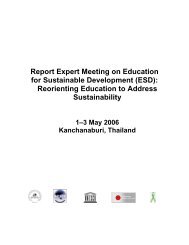Module 11 | Indigenous knowledge and sustainability - APCEIU
Module 11 | Indigenous knowledge and sustainability - APCEIU
Module 11 | Indigenous knowledge and sustainability - APCEIU
You also want an ePaper? Increase the reach of your titles
YUMPU automatically turns print PDFs into web optimized ePapers that Google loves.
following the buddhist religion in India,<br />
for example, have survived many<br />
droughts because they will not kill an<br />
animal or a tree. They breed cattle<br />
selectively, monitor the feeding of their<br />
camels, <strong>and</strong> live on milk, yogurt <strong>and</strong> a<br />
few cultivated crops. Many people have<br />
developed a detailed underst<strong>and</strong>ing of<br />
animal behaviour. Those living in tropical<br />
forests, for example, recognise that<br />
where two different ecological zones<br />
meet, the hunting is more productive.<br />
Many even grow crops or trees to<br />
attract certain animals <strong>and</strong> increase<br />
their numbers.<br />
Source: Burger, J. (1990) The Gaia<br />
Atlas of First Peoples: A Future for<br />
the <strong>Indigenous</strong> World, Penguin Books,<br />
Ringwood, pp. 40, 44.








